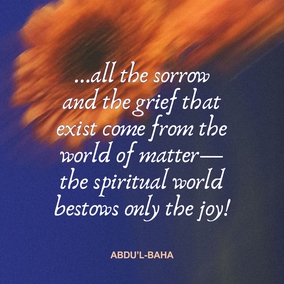The views expressed in our content reflect individual perspectives and do not represent the authoritative views of the Baha'i Faith.
A colleague sent me an email today lamenting, “I have two lists — one immediate (which grows ever longer) and the regular list which stays the same.” I enjoyed his wit, and also felt sympathetic.
Yes, it does seem like there are always things to do, even while new immediate items keep popping up. As a consequence, the regular list just seems to languish. The resulting tussle between the two contributes to the breathless, stressful, even anxious state where many of us find ourselves.
Journalist and humorist H. Allen Smith had a fun way of explaining lists: “The human animal differs from the lesser primates in his passion for lists.”
I admit that I do like lists. They make me feel in control, both on the job and at home. So this evening, intrigued with my colleague’s comments, I tried sorting mine into two lists depending on whether the items seemed to be immediate or regular.
I noticed that some items had been there for a long time. If this was because they no longer have meaning, I took a deep breath then deleted them. Next, I looked at what was left and sorted them into one list or the other.
I decided that “immediate” meant anything with high impact outcomes for either myself or others. Two other criteria were whether delaying would make them more difficult to do; or if they had an actual deadline imposed by others.
Everything else went onto the “regular” list, but that didn’t mean they weren’t worthwhile. I realized that if I don’t make a point of getting to them, then they will probably never get done. I must take time for myself and sometimes be willing to do regular tasks, temporarily postponing the otherwise immediate ones. Whether this is planning for an event, taking steps toward a vacation, sorting through a stack of papers, or anything else that seems like it could be put off — they each belong to a scheduled time.
Dan Millman, athlete, author, and pioneer in the self-help field, said:
I learned that we can do anything, but we can’t do everything … at least not at the same time. So think of your priorities not in terms of what activities you do, but when you do them. Timing is everything.
I have a friend who schedules for herself a power hour for tasks that otherwise won’t get tended to. I like this idea, as I am motivated by making progress and building momentum. If I can’t actually finish the task within the hour, I give myself the option of continuing or not. Hopefully I can develop the insight to recognize interim steps and have confidence in long-term results.
In the words of Abdu’l-Baha, from a speech he gave in London in 1911, speaking about items greater than my own to-do lists: “Knowledge is the first step; resolve, the second step; action, its fulfillment, is the third step.”
Just putting something on the list is a start.
Beyond that, resolve requires more passion, commitment, and energy. Scheduling, follow-up, and concrete steps indicate action. Fulfillment — being able to cross something off your list as finished — brings satisfaction.
Several years ago I attended a lecture on setting goals. The speaker suggested putting an item on our list that we’re going to do anyway, to guarantee having something to mark as finished later. I’m not keen on trying to fool myself to that extent. Instead I want to learn to juggle better, to keep immediate items in perspective, and to pay attention to the regular items.
My goal: to someday return to having just one list again, and not feel overwhelmed by it. Maybe I should put THAT on my list, too.















Comments
Sign in or create an account
Continue with Googleor